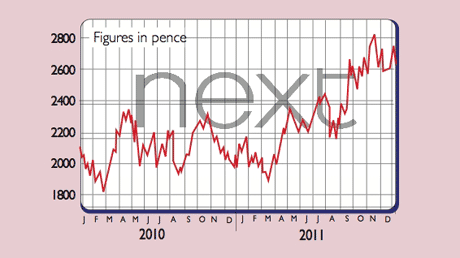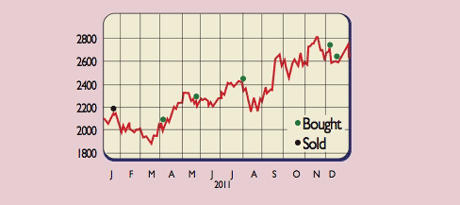Shares in focus: Next rides out the retail downturn
Next saw strong gains in 2011, says Phil Oakley. But with the economy still weak, can it keep up the momentum?
Get the latest financial news, insights and expert analysis from our award-winning MoneyWeek team, to help you understand what really matters when it comes to your finances.
You are now subscribed
Your newsletter sign-up was successful
Want to add more newsletters?

Twice daily
MoneyWeek
Get the latest financial news, insights and expert analysis from our award-winning MoneyWeek team, to help you understand what really matters when it comes to your finances.

Four times a week
Look After My Bills
Sign up to our free money-saving newsletter, filled with the latest news and expert advice to help you find the best tips and deals for managing your bills. Start saving today!
What does Next do?
Next sells clothes, shoes, fashion accessories and items for the home from 532 shops in Britain and Ireland, and more than 180 stores overseas. Its web-based mail-order business, Next Directory, is also available in 35 other countries via NextDirect.com. The firm also has a sourcing business based in Asia and Britain, which concentrates on the buying and quality control of Next products.
What is its history?
Next traces its roots back to 1864, when gentlemen's tailors, J Hepworth & Son, was founded in Leeds. In 1981, Hepworth then chaired by designer Terence Conran bought a chain of rainwear shops, Kendalls, which it redeveloped as a womenswear brand.
The first Next store opened in 1982. During the 1980s, it grew aggressively, moving into new areas, such as menswear and children's wear. By 1988, it had over-reached itself, and then-chief executive George Davies was ousted. In the same year, it launched its home shopping business, and by the mid-1990s, the company had been turned around and had more than 300 shops in 16 countries. The company has rewarded shareholders handsomely, thanks to strong cash generation.
MoneyWeek
Subscribe to MoneyWeek today and get your first six magazine issues absolutely FREE

Sign up to Money Morning
Don't miss the latest investment and personal finances news, market analysis, plus money-saving tips with our free twice-daily newsletter
Don't miss the latest investment and personal finances news, market analysis, plus money-saving tips with our free twice-daily newsletter
Who runs it?
Simon Wolfson has been chief executive since 2001, having joined the firm in 1991. He was paid £1.8m in 2010/2011. Under Wolfson, the strong performance has continued: since 2002, dividends have almost trebled; the share price has more than doubled and the company has bought back £2.4bn of shares. David Keens is finance director. John Barton is chairman.
How's trading?
From 1 August to 24 December 2011, Next brand sales rose by 3.1%. The performance of the retail stores reflected a very tough consumer spending environment, with sales down 2.7%. However, Next Directory continued to perform strongly, with sales up 16.9%. Next chose not to discount any products before Christmas and was therefore able to maintain its profit margins.
What's the outlook?
Next expects its pre-tax profits for 2011 to have grown by 4% to around £565m. However, its ongoing share buy-backs have reduced the number of shares in issue so earnings per share (EPS) are expected to increase by more than 11%. This should see shareholders rewarded with another healthy dividend increase.
The trading outlook for 2012 is tough due to a weak economy, rising unemployment and intense competition. As a result, Next does not expect much profit growth for the year. Nonetheless, it does expect to generate £200m of surplus cash flow to buy back more of its shares.
The analysts
Of the 32 analysts surveyed by Bloomberg, 16 say "buy", ten say "hold" and six "sell". The average price target is 2,811p 9% above the current share price. Most bullish amongst the analysts is Numis Securities with a 3,200p price target. Goldman Sachs is most bearish with a 2,450p target.
The numbers

Stockmarket code: NXT
Share price: 2,579p
Market cap: £4.4bn
Net assets (July 2011): £113.2m
Net debt (July 2011): £640.2m
P/e (current year estimate): 9.9 times
Yield (prospective): 3.7%
Our view
Next's thriving Directory business and strong cash generation set it apart from most of its peers. But retail is under pressure and the shares have already seen strong gains in 2011. Hold.
Directors' dealings

Non-executive directors Christine Cross and Francis Salway respectively purchased 3,098 and 6,702 shares in May and July last year. Group product director Christos Angelides sold 18,953 shares in January 2011.
There are no formal shareholding guidelines for directors of the company. Recent share dealing activity can be seen in the chart on the left; the main directors' shareholdings are shown in the table below.
Director and shares held
S Wolfson: 1,638,010
D Keens: 151,574
A Varley: 76,460
C Angelides: 72,975
J Barton: 16,000
Get the latest financial news, insights and expert analysis from our award-winning MoneyWeek team, to help you understand what really matters when it comes to your finances.
Phil spent 13 years as an investment analyst for both stockbroking and fund management companies.
-
 Should you buy an active ETF?
Should you buy an active ETF?ETFs are often mischaracterised as passive products, but they can be a convenient way to add active management to your portfolio
-
 Power up your pension before 5 April – easy ways to save before the tax year end
Power up your pension before 5 April – easy ways to save before the tax year endWith the end of the tax year looming, pension savers currently have a window to review and maximise what’s going into their retirement funds – we look at how